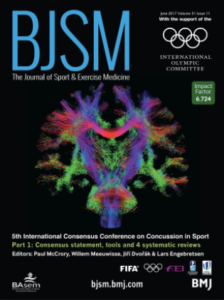Objective: To conduct a sensitivity analysis of the King-Devick (K-D) test in professional football.
Design: Prospective cohort.
Setting: Professional football.
Participants: 269 professional football players from the Canadian Football League (CFL). There were 24 concussions to analyse.
Intervention: The K-D test was added to the existing CFL concussion protocol (medical and SCAT3). All participants completed K-D assessments at baseline, at the time of injury/concussion (TOI), and at medical clearance prior to return to play (RTP). 20 controls were re-tested post-baseline.
Outcome measures: K-D scores were analysed to construct a sensitivity analysis.
Main results: TOI K-D results were significantly higher (mean=50.21, range: 35.4–107.4) than baseline K-D results (mean=44.3, range 28.4–66.4; p<0.01). TOI K-D results yielded 94% sensitivity and 80% specificity for diagnosing concussions. Four groups emerged from the TOI data. In Group 1, 4/4 were asymptomatic within 24 hours and scores were better (lower) than baseline; Group 2 were asymptomatic within 72 hours and 8/9 had abnormal (poorer) scores; Group 3 were asymptomatic within 11 days and 5/5 had abnormal scores. Group 4 were symptomatic by season’s end and 4/4 had abnormal scores. 18/18 players who RTP had better K-D scores than baseline prior to RTP.
Conclusions: The K-D test proved to be useful for concussion diagnosis. Interestingly, the players in Group 1 had normal TOI K-D scores and were asymptomatic in <24 hours. More research is needed and the CFL will continue this next season.
Summary Points:
- During the Canadian Football League season, data from 24 concussions were analyzed.
- The K-D Test performance at the time of injury was significantly higher (worse) than baseline.
- The K-D Test yielded a 94% sensitivity and 80% specificity for identifying concussive injury.
- The K-D Test proved to be useful for concussion detection.

